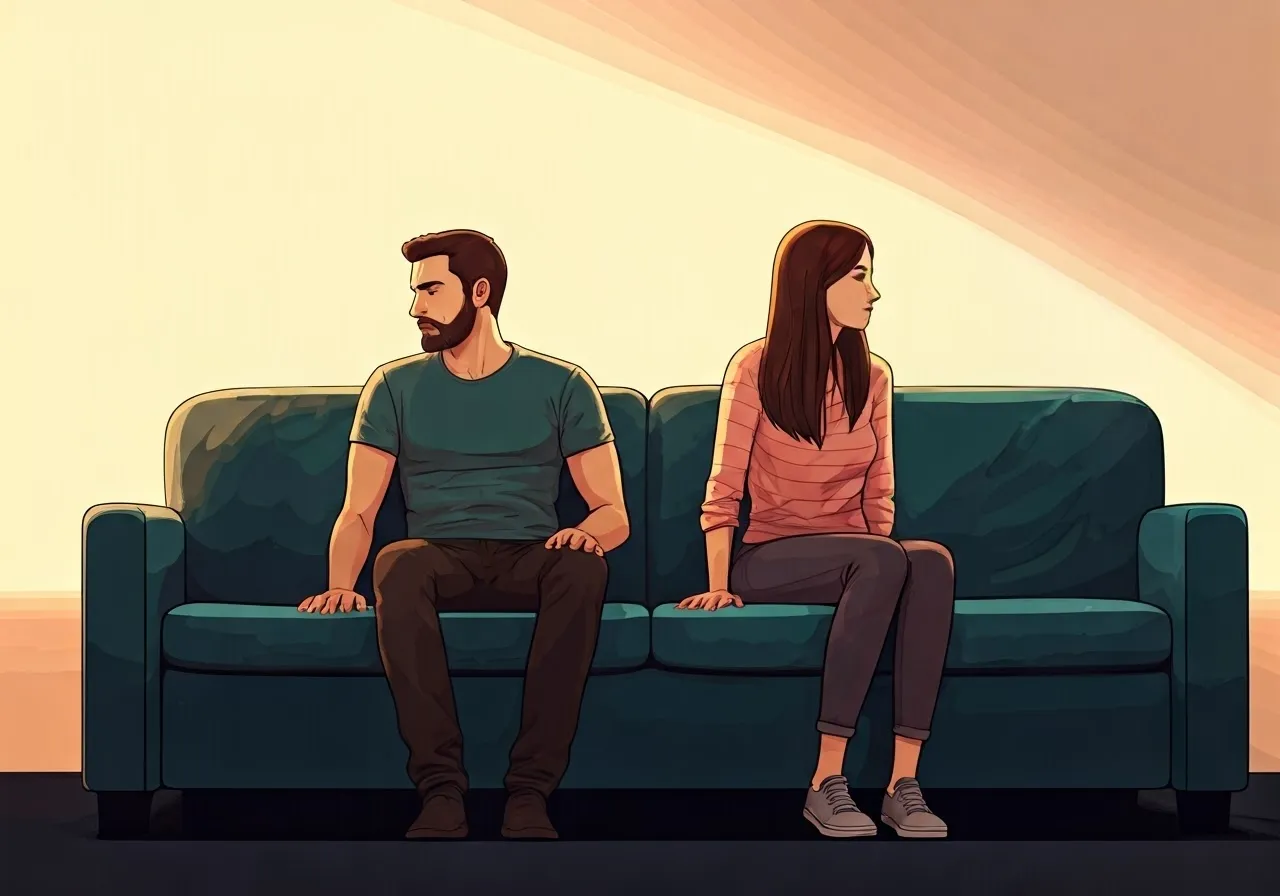Being in a relationship usually means you have companionship and shared moments. However, it's normal to feel lonely even when you are with someone. These feelings of loneliness and sadness can deeply affect our mental health and well-being, as highlighted in the American Journal of Preventive Medicine. This shows how important it is to have a strong emotional connection with our partners.

Loneliness in a relationship can show up in small ways, leaving people feeling confused and alone. It’s a tricky feeling that can come from different things like unmet expectations, life changes, or problems in the relationship.
Ignoring these feelings can weaken a relationship, causing more distance and anger. Recognizing loneliness and knowing why it’s there are key steps to building a stronger and more connected partnership.
Feeling lonely in a relationship is confusing. People are social by nature and want connections with others. When our need for connection isn’t satisfied, we can feel lonely, even in happy relationships.
Emotional intimacy can help with loneliness. It includes trust, vulnerability, and a deep understanding between partners. Still, many things can block emotional intimacy, making us feel alone even when we are close to someone.
Changes in life, work stress, and personal issues can create distance in a relationship. It's important to see these problems and work together to rebuild emotional intimacy. This can help reduce the sense of loneliness and make the bond between partners stronger.
In a busy city like Houston, life moves quickly, and relationships can sometimes get neglected. Couples in Houston deal with special challenges that can lead to feelings of loneliness.
One common issue is the lack of intimacy, both emotional and physical. This often affects couples who feel lonely. Long work hours, demanding jobs, and the race for success barely leave time or energy to build an emotional connection in a relationship.
Also, keeping up with a social life while being committed to a relationship is not easy. When partners start to live more separately and share fewer interests, it can lead to feelings of isolation and loneliness.

Noticing the small signs of loneliness in your relationship is very important. You need to address the issue before it gets worse. Look at how you and your partner connect. Have you both talked less or shown less affection?
Do you feel distant or wish you could spend more quality time together? These might be warning signs of loneliness in your relationship.
Emotional distance happens when there is no emotional connection or intimacy, and it can often relate to different attachment styles. This can lead to feelings of loneliness in relationships. It shows up as a gap between partners. This gap makes people feel less connected and can take away the joy and security they used to have together.
It's important to notice the signs of loneliness caused by emotional distance. Has talking become hard or just looks like small talk? Do you argue more or pull away from each other? Are you afraid to share your thoughts and feelings with your partner?
To fix emotional distance, you need to communicate openly and listen to each other. You both must be willing to work together to bring back intimacy and avoid potential rejection and feelings of emotional abandonment in your relationship. Ignoring these signs can lead to a bigger disconnect and might harm the foundation of your relationship.
It's normal to get into a routine in any long-term relationship. But when this routine lacks quality time, enough time for meaningful talks, and shared experiences, it can make you feel lonely. A lack of intimacy, both emotional and physical, often comes along with this gap in communication.
Couples may find themselves just going through their days, completing daily tasks, and meeting their obligations without really connecting. This absence of intimacy can cause doubts and insecurities. You might start to feel like you are living with a stranger instead of a partner, especially if one partner's behaviour includes spending a lot of time on their own activities.
If you notice you are living separate lives without shared joy, excitement, or even simple daily chats, it's important to focus on communication and bring intimacy back into your lives.
Talking about loneliness with your partner can be scary, but it’s important to do. Find a moment when you both feel calm and open to talk.
Share your own feelings and needs with care. Avoid blaming your partner. Keep in mind that you are a team. You both are working together to make your relationship stronger.
Opening up about feeling lonely takes some courage. It’s important to share your feelings openly and in a vulnerable way to foster a sense of connection. First, find a safe and comfortable place where you both feel good. Talk from a place of love and understanding. Focus on your own feelings instead of blaming the other person.
When sharing your needs, use "I" statements. For instance, instead of saying, "You never make me feel special," say, "I feel lonely and would like it if we could spend more quality time together."
Here are some tips to start the conversation:
Open and honest communication is very important in a healthy relationship. This is especially true when talking about sensitive issues like loneliness. It’s key to avoid blaming or criticizing each other. Instead, focus on sharing your own needs and really listening to your partner's view.
When you talk about loneliness, use "I" statements. This helps you express your feelings without sounding like you are pointing fingers. For example, instead of saying, "You're always busy with work," you can say, "I feel a bit ignored when we don’t spend much quality time together."
If talking feels tricky or unhelpful, consider getting professional help. A therapist or counselor can create a safe space where you can both talk openly. They can help you explore your feelings, build better communication, and work on strengthening your emotional connection.

Once you start talking and build understanding, work hard to bring back your connection and intimacy. This means putting in effort and deciding to make your relationship important.
Have regular date nights, focus on quality time together, and discover hobbies you both enjoy. These things will help you reconnect, make memories together, and rebuild intimacy.
Living in a lively city like Houston gives couples many chances to reconnect and find the spark again. You can plan fun date nights that are more than just dinner and a movie. Try Houston's different food options, go to a concert or live show, or enjoy the city's arts and culture.
It is important to make time for each other even when life gets busy. Set aside special time, even if it's just an hour every evening, to turn off distractions and really focus on one another. You could enjoy a shared hobby, snuggle up with a good book, or talk about your day.
Keep in mind that quality time doesn't have to be fancy or perfectly planned. Often, the simplest times, like cooking together or walking hand in hand, can be the most special.
Stepping outside your comfort zone together and trying new things can bring back excitement. It can also help you build an authentic connection. Houston has many options for fun activities that will get you moving and make great memories.
You can try a salsa dancing class, ride bikes in the city's parks and trails, or test your skills at an escape room. These fun activities change your routine. They also create chances for laughing, playing, and bonding as you face new challenges together.
When you break away from daily habits and welcome new experiences, you start to see each other in a new light. This can help you appreciate your partner more and strengthen your bond.
Nurturing your romantic relationship is very important. However, building a strong support system outside of it is just as crucial. Keep your friendships strong, explore your hobbies, and take part in activities that make you happy. These things help you feel good overall.
When you feel supported and content on your own, you can be a more loving and present partner.
Keeping a good social life outside your romantic relationship is important. It helps fight loneliness and encourages personal growth. Spending time with friends, enjoying hobbies, and doing things you love can make your life more balanced and joyful.
When you take care of yourself and know who you are, you can offer more to your relationship. Individual therapy can be a great way to understand your needs, and practices like meditation can also help you deal with loneliness and any personal issues that might affect your relationship, especially if you share your journey on social media like Instagram.
Remember, a healthy relationship grows when both partners feel supported and happy. They should also have the freedom to enjoy their hobbies and interests.
Getting involved in community activities is a great way to meet people who have similar interests. It helps reduce social isolation and creates a feeling of belonging. Houston has many chances for you to take part in these activities.
You can volunteer at a local charity, join a book club, or go to workshops and events that interest you. These activities let you meet new people, learn new skills, and do something meaningful.
When you take part in activities outside your relationship, you find a new sense of purpose. This can positively affect your relationship by bringing in fresh energy and new ideas.
If you have tried to fix loneliness in your relationship and things are not getting better, it may be time to get professional help. A therapist can offer a safe place for you and your partner. You can talk about the issues causing your loneliness.
Therapy can give you good ways to communicate. It can also provide tools to rebuild intimacy and help you solve problems together. Seeking professional help shows strength. It also means you are committed to having a healthier and happier relationship.
Couples therapy is led by a trained relationship expert, including a clinical psychologist. It creates a safe space for couples to work through various problems and increase mutual understanding. Chronic loneliness can mean that there are deeper issues in the relationship, especially when you feel lonely despite trying to solve it on your own.
A therapist can help you and your partner recognize bad communication habits. They can also help reveal hidden emotional pain, including emotional abuse, and suggest ways to bring back intimacy and connection. The therapist offers a neutral point of view to help you have good conversations and find workable solutions.
Keep in mind that seeking couples therapy is not a sign of failure. It shows your desire to build a stronger and happier partnership.
Finding the right couples therapist in Houston is crucial for ensuring a positive and productive therapy experience. Many qualified therapists specialize in relationship issues and offer both in-person and online couples therapy options.
Start by seeking recommendations from trusted sources, such as friends, family members, or your primary care physician. Online directories like Psychology Today and GoodTherapy provide comprehensive listings of therapists, allowing you to filter by specialty, location, and insurance coverage.

In conclusion, feeling lonely in a relationship is common. It needs open talks and good understanding between partners. It is important to notice the signs of emotional distance and poor communication. By starting conversations and planning quality time together, you can bring back connection, intimacy, and closeness. Also, having your own social life helps. There are different ways to get professional help through couples therapy or individual therapy, which can be very useful too. Don't forget, having a strong support team inside and outside your relationship can help deal with feelings of loneliness. If you want more help with loneliness in your relationship, think about talking to a qualified therapist in Houston, TX.
Yes, feeling lonely at times in a relationship is normal. It does not mean the relationship is failing. Instead, it shows how important it is to talk about those feelings. Working on your emotional connection can help strengthen the bond you share.
Share your feelings openly and truthfully, but do it with kindness. Use "I" statements to show your needs without pointing fingers. Focus on working together to find solutions.
Individual therapy can help you better understand your role in loneliness. It can also teach you healthier ways to cope with feelings and improve how you communicate in your relationships.
Following your own interests can make you feel fulfilled and help you grow. This growth can also help your relationship. It brings new ideas and energy to it.
Yes, Houston has many support groups and community resources for couples dealing with relationship issues, including loneliness. You can check online directories or ask a therapist for suggestions.
Stay informed about the latest research in psychology.
.png)
Explore how Internal Family Systems (IFS) therapy heals trauma and restores self-leadership.
.png)
Explore how Internal Family Systems (IFS) therapy heals trauma, anxiety, and inner conflict.
.png)
A practical guide to recognizing, preventing, and healing teacher burnout in Houston schools.